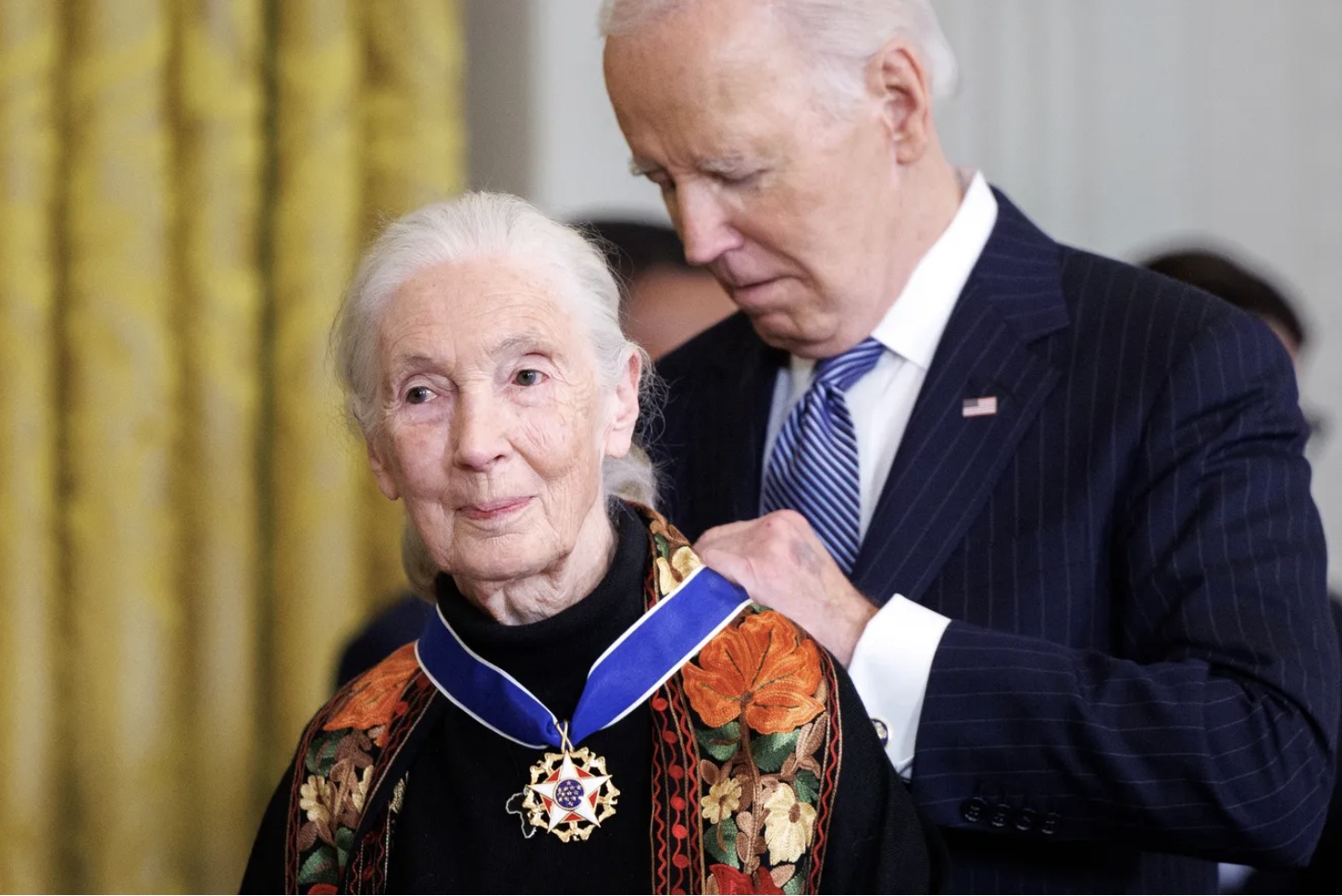From the forests of Gombe to the halls of the United Nations, Jane Goodall spent her life listening to, and speaking for, the wild. Her impact will echo for generations.
A Life Devoted to the Wild
Jane Goodall, the world-renowned primatologist, conservationist, and United Nations Messenger of Peace, has died at 91.
A pioneering scientist who forever changed our understanding of animal intelligence and empathy, Goodall’s passing marks the end of an era, but not the end of her influence.
Born Valerie Jane Morris-Goodall on April 3, 1934, in London, she dreamed as a child of “going to Africa, living with wild animals, and writing books about them.” Few could have imagined that dream would reshape not only the study of primates but humanity’s relationship with the natural world.
A Hero to Many, Including Leonardo DiCaprio

Among the millions mourning her loss is actor and environmentalist Leonardo DiCaprio, who shared a heartfelt tribute on Instagram.
“Jane Goodall devoted her life to protecting our planet and giving a voice to the wild animals and the ecosystems they inhabit,” he wrote. “She never stopped. My last message to Jane was simple: ‘You are my hero.’ Now, we all must carry the torch for her in protecting our one shared home.”
The two collaborated on several conservation initiatives, including the 2024 film Howl, which explored the relationship between humans and the natural world through an animal’s perspective. Their bond was built on a shared belief in hope, empathy, and collective responsibility.
The Scientist Who Redefined Humanity
In 1960, at just 26 years old and with no formal scientific degree, Jane Goodall arrived in Gombe Stream National Park, Tanzania, to study wild chimpanzees. Under the mentorship of famed anthropologist Louis Leakey, her observations changed science forever.
When Goodall documented chimpanzees using tools to fish for termites, a behavior previously believed to be uniquely human, the scientific world was stunned. “We must now redefine man,” Leakey said, “or accept chimpanzees as human.”
Goodall went on to earn her Ph.D. from Cambridge University without first obtaining a bachelor’s degree, an unprecedented achievement. Her research evolved into the longest-running continuous wildlife study in history, still active at Gombe more than six decades later.
Her discoveries blurred the line between humans and animals, challenging deeply held notions of superiority and separation.
Advocate, Educator, and Global Citizen
As her fame grew, Goodall shifted her focus from research to activism. In 1977, she founded the Jane Goodall Institute, dedicated to conservation, animal welfare, and community-led initiatives. In 1991, she launched Roots & Shoots, a youth-led program that now spans more than 75 countries, empowering young people to become stewards of the planet.
In a 1998 interview, she warned about the “greed and materialistic societies” eroding the Earth’s biodiversity and urged a return to harmony with nature.
“We’re problem-solving creatures,” she said. “Our brains have created incredible technology, but we must now use that same brilliance to protect the planet.”
Her message remained consistent throughout her life: humans are not separate from nature, we are part of it.
Honors as Vast as Her Vision

Goodall’s work earned her the highest honors in science and humanitarian service, including the French Légion d’Honneur, the Kyoto Prize, the Tyler Prize for Environmental Achievement, and the Presidential Medal of Freedom. She was also named a Dame Commander of the Order of the British Empire in 2004.
Yet, accolades were never her goal. “Every single one of us makes a difference every day,” she often said. “It is up to us what kind of difference we make.”
Her words inspired generations of scientists, environmentalists, and ordinary citizens alike, urging each to act with compassion and responsibility.
A Legacy Rooted in Hope
Jane Goodall passed away peacefully of natural causes at her home in Bournemouth, United Kingdom. She is survived by her son Hugo Eric Louis van Lawick, three grandchildren, and her sister Judy Waters.
Her life’s work continues through the programs she founded, the forests she helped protect, and the millions she inspired to view animals, and each other, with empathy.
As she once told interviewer Jeff Schechtman, “Nature is amazingly resilient if we give her the chance.”
For Jane Goodall, that chance was her life’s mission.
For the rest of us, it remains her legacy.
Featured Image From: U.S. Mission Uganda, CC BY 2.0, via Wikimedia Commons

